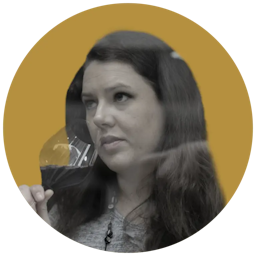Opening the Doors to Germany’s Secret Wine Stash
If this terroir was in France or Italy, you can be sure Rosswag would be rubbing shoulders on wine lists next to Burgundy and Piedmont.

Describing my recent eye-opening experience of sipping Lemberger in Rotenfaden’s garden in the village of Rosswag in the region of Württemberg in Germany is one of those stories that leaves people saying, “What are you talking about?” To most, those words don’t mean much of anything.
I assume most readers know where Germany is, and that it’s a country that produces wine. Traditionally it was considered the northern edge of viable viticulture, where most years the grapes just barely ripen. For this reason, its reputation is built on Riesling and crisp white wines. Some German regions have always grown red grapes, but few of those wines make it past its own borders, as the Germans drink way more wine, especially reds, than they produce.
Württemberg is a German wine region I never seem to remember exists — at least I didn’t this time until I was on my way there. Except for Baden, it’s the southernmost vine-growing area, meaning slightly warmer temperatures that offer the ability to ripen some red grapes more consistently. The region’s claim to fame, if there was any notoriety to speak of, is the obscure Trollinger, also known as Schiava in Alto Adige, Italy, which is not famous there either. Being a center for red grapes (especially unknown varieties) in a country that consumes all its own red wines accounts for its anonymity in export markets like the U.S.
I also think it might have something to do with the magical qualities of some of the wines produced there. Those who make and consume it don’t want the word to get out. This is Germany’s secret stash. Classified information is hard to keep in this globalized world, though, and thanks to a few intrepid importers finding some supremely talented producers, we can all join the club now.
If Württemberg is obscure, Rosswag might as well be underground. It’s so cool, and it doesn’t even know it. It’s a town, perched along the river Enz, which, over thousands of years, has slowly cut away hillsides till we are left with a steep, 1,000-foot-high limestone amphitheater. Centuries-old terraces are covered in Trollinger, Lemberger, Riesling, Schwarzriesling (Pinot Meunier, like the one in Champagne), Spätburgunder (Pinot Noir), and Müller-Thurgau. If this terroir was in France or Italy, you can be sure Rosswag would be rubbing shoulders on wine lists next to Burgundy and Piedmont.
Lacking a champion winemaker doesn’t help the situation. This is co-op land where the villagers below collectively own 99 percent of the vineyards, many with just a few rows each. Harvested grapes are returned to farmers in the form of wine, produced by the cooperative, and nearly all is drunk at their dinner tables.
What about that other 1 percent? There is a champion in the making: Weingut Rotenfaden is the love child of Hannes, a Rosswag native, and his Greek winemaker wife Olympia. They have cobbled together parcels totalling 3.5 hectares, all rigorously farmed under organic and biodynamic methods. They have even employed the use of a drone to help spray those hard to reach corners (an application of drones that I can’t wait to see utilized elsewhere).
Besides being the only people in town making their own wines, their sword in the stone is Lemberger. Also known as Blaufränkisch in Austria, this underdog varietal is slowly being appreciated by wine lovers for its terroir transparency, classic structure, and signature spicy aromatics. In the hands of Hannes and Olympia, the very best of both the grape and the place are being coaxed out, and heads are quickly turning toward their unknown corner of the globe.
Their elegant wines were not the only thing being discussed in their garden. They’ve actually teamed up with the co-op and their U.S. Importer, Vom Boden, to help raise the profile and improve the financial situation of the region. Olympia and Hannes are helping the villagers implement sustainable methods of farming, increasing the quality of the gapes along the way.
They also use some of the best plots to make a red and white field blend, which is purchased by Vom Boden at a much higher price than the co-op wines. These wines, found under the Vineyard Project Roterfaden & Rosswag “Terraces” label, are a joy to drink. They also are a looking glass into a newly discovered, very old place worth knowing about for anyone who loves wine.

